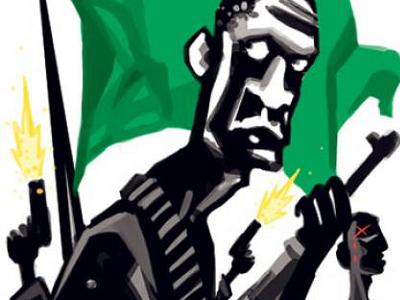Arab Media Cannot Ignore the Truth about Libya’s Blacks

Image Credit: Nino Jose Heredia/©Gulf News
By Ramzy Baroud, Special to Gulf News
When Libyan rebels intercepted and seized a British intelligence and Special Forces unit in early March, the matter was handled with a sense of urgency and diplomacy. While all eight members of the SAS unit were reportedly released ‘unharmed’, black Africans haven’t been so lucky.
Since the popular Libyan uprising began in February, the widespread targeting of people merely because of their skin colour has gone largely unreported. Few were interested in tainting the image they had constructed of the Libyan revolution, fearing perhaps that such criticism could give credence to Muammar Gaddafi’s violent efforts to suppress democracy. However, the story involves more than simple attempts at keeping a revolution uncontaminated by ‘suspicious’ characters (who just happen to be mostly black Africans).
While Libya is an Arab and African country, it also comprises black African tribes, Berber and other ethnicities. Gaddafi exploited Libya’s multi-layered identity whenever it suited him. When he failed to achieve leadership status among his Arab peers, he turned to Africa — but from a condescending standpoint, designating himself the ‘King of Kings of Africa’. It was a wretched act by a self-obsessed leader, but it also reflected a sense of superiority that some in his country harbour towards black Africans.
Writing in the British Independent on February 24, Michael Mumisa reminded us of a statement made by Gaddafi during a visit to Rome in August 2010: "We don’t know what will happen, what will be the reaction of the white and Christian Europeans faced with this influx of starving and ignorant Africans."
Interestingly, Italy was largely mute during the first weeks of the Libyan uprising, fearing perhaps that Libyan chaos would usher in a flood of unwanted illegal immigrations.
Black Africans have always harboured a love-hate relationship towards Libya. The country has served as a rife market for cheap labourers and unskilled workers, and many poor immigrants saw its approximately 2,000 kilometre Mediterranean coast as a gateway for economic salvation and opportunity.
Libya used — but also abused — many of these poor immigrants, and chances are they were utilised as mercenaries in Gaddafi’s forces. However, reports on the extent of the employment of Africans in the Libyan war are yet to be independently verified.
Watching Arabic television during the early weeks of the Libyan revolution, one might get the impression that rebels and civilians were being targeted exclusively by armed African men, or "savage mercenaries" as they were often called. In fact, the term murtazaqa — Arabic for mercenaries — became so common that it actually defined Libyan revolutionary discourse from the onset. Of course, Arab audiences were presented with ‘eyewitness’ accounts of black people raping, pillaging, murdering and deliberately trying to destroy the aspirations of the Arab people.
Mercenaries
"Across eastern Libya, rebel fighters and their supporters are detaining, intimidating and frequently beating African immigrants and black Libyans, accusing them of fighting as mercenaries on behalf of Gaddafi," the Los Angeles Times reported on March 4.
Thousands of Africans are employed in construction and other low-paid jobs throughout Libya. Many of those imprisoned, beaten or even killed during the ‘mercenaries hysteria’ may well have been completely innocent.
Some Arab media, electrified by the successes of the Tunisian and Egyptian revolutions — both popular, inclusive and largely non-violent — were thrilled by the prospect of change throughout the Arab world. They deliberately slanted their coverage of subsequent revolts to fit the exact models that transpired in Tunis and Cairo — even if a new scenario compelled an entirely different comprehension and thus media coverage.
In Libya, for example, the popular uprising quickly turned violent, and it was defined largely by geography — as in East Libya and West Libya. Tribal allegiances in Libya played a large part in the classification of opposing forces. Worse, the armed rebellion invited western powers eager to be involved in moulding the future of a rich Arab country.
Most of this was overlooked by Arabic media, and the complexity of the Libyan discourse was reduced to a simplistic and polarising dichotomy of good versus evil. "What we are looking at here is the ugly face of revolution," reported Jacky Rowland for Al Jazeera on March 1. It was one of few reports on the crimes reportedly committed against blacks in Libya. Half-hearted reports bashfully attempted to cover a subject that seemed like more of an irritant than a serious issue requiring international attention.
Some Arab media created such an inspirational discourse of the Arab awakening that it became almost impossible to speak of black people being chased by angry mobs. Such selective coverage sacrificed truth and journalistic integrity, and it critically aided in the violation of human rights.
Even if a solution to the current struggle is somehow reached, civil strife in Libya will not end any time soon. The media can still correct its skewed coverage to shed light on the predicament of persecuted Africans and black Libyans. We need to see a major rethink in the way Arabic media covers the Arab uprisings.
It is simply unacceptable for an Arab TV station to rejoice at the prospect of Arab awakening for freedom and democracy on the one hand, and simultaneously ignore flagrant acts of racism and human rights violations on the other.
– Ramzy Baroud is an internationally syndicated columnist and the editor of PalestineChronicle.com. His latest book is My Father Was a Freedom Fighter: Gaza’s Untold Story.










































0 Comments